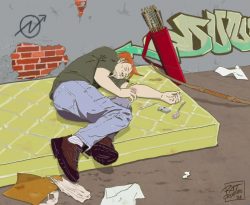How Language and Words like “Clean” and “Dirty” Influence Recovery Efforts
Language and words are some of the most powerful things. People use words to convey feeling, thought, and emotion. There is little wonder that certain words convey condemnation and derision. Although many people might consider it soft skinned to think of words as a way to condemn or degrade someone, it is an issue when society thinks poorly of the individual that those words are about. Some words have a very positive connotation such as upstanding or professional.
There is much to be said for changing the language used in relation to addiction treatment. Everyone can agree that using positive language that encourages others is more likely to illicit a positive response from them. Using words that tear someone down or place undue blame on them only furthers negativity. To understand how language effects recovery efforts, it is important to know what words and phrases have a negative impact, which ones have a positive impact, and how much changing that perception can influence recovery from addiction.
Negative words and phrases related to addiction.

The word “junkie” is commonly used in popular media.
The majority of the vernacular relating to addiction and recovery holds a negative connotation. This is a throwback to the earliest days of addiction treatment, where it was thought that addiction was a moral issue, rather than a medical one. As such many of the words and phrases reflect an ideology that a person’s addiction is a reflection of personal failures. That if they were a better person, then they wouldn’t have a problem. Some of these words and phrases include:
- Junkie, a slang term used to describe someone with an addiction,
- Addict, an accurate, yet stigmatized term similar to junkie,
- Testing dirty, a phrase used to describe a urine or blood screen testing positive for drugs,
- Cleaning up, a phrase used to describe the recovery process that implies that the patient is “dirty”, and
- Having a habit, a phrase meaning “to have an addiction”, but implying that it is something that can just be stopped, if the person dealing with substance abuse really wants to.
- User, a word meaning you use drugs, behaviors or people.
- Tweeker, a word specifically for meth addicts.
This is not anywhere near a complete list. All of these words and phrases follow a similar theme. They dehumanize a person suffering from addiction, belittle the fact that addiction is a medically recognized disease, and make the patient feel as if they are solely to blame for their addiction. While it is doubtful that much of this language is used maliciously, particularly in the recovery setting, it has a strong negative impact, nevertheless. This brings up a new question. What language should be used instead?
Alternative language with a positive impact.
According to an editorial published in the journal “Substance Abuse”, there are four things to keep in mind when talking about addiction, and those suffering from it. These are:
- Using “people-first” language that upholds dignity and respect,
- Using language that focuses on the fact that substance abuse disorders are a disease,
- Using words and phrases that promote the treatment process, and
- Avoiding using slang terms or idioms that accentuate stereotypes or further biases.
This idea may seem confusing at first, but it is actually pretty simple. When you think of a phrase that contains derogatory language, also think of how you would feel if someone spoke to you like that. Here are some suggestions of certain phrases to fit this more positive framework:
- Addiction recovery patient, instead of “addict” or “junkie”
- Suffering from a substance abuse disorder, instead of “having a habit”
- Seeking treatment for addiction, instead of “cleaning up”
- Finding measurable levels of opiates in a urinalysis screening, instead of “testing dirty”
These phrases remove the stereotypes and implications of immorality. They focus more on the medical nature of substance abuse, and encourage treatment. Simple adjustments like these can greatly affect the outcome of substance abuse treatment and recovery for many patients.
Strength to Overcome Addiction
When someone has the strength to overcome addiction, it is important to do everything possible to help them make a complete recovery. A recovering addict faces anxiety, depression, loss, hopelessness, despair, and both physical and incredible cravings. It is important to remember overcoming addiction takes a very strong will. Adding the stigma of addiction and being looked down on to that is unfair to both the addict and his or her family. When an addict first goes into sobriety, they are in a fragile state. The way that people look at them or the words that are used to describe them can break their carefully constructed sober world. This influence on their recovery can drive them back into relapse.
With the incredible stigma placed on addiction the language that people use should not add to it. This stigma is dangerous to the people who are trying to pull themselves out of a very difficult problem. The point is, they are doing it, society should not look down on them for trying to quit which ever drug they are on.
Everyone deserves to be treated with respect regardless of his or her addiction. It is only when we stop using negative language to describe them that the negative stigma will also begin to subside. People are not their addiction, they are not clean, or dirty, they are simply people.